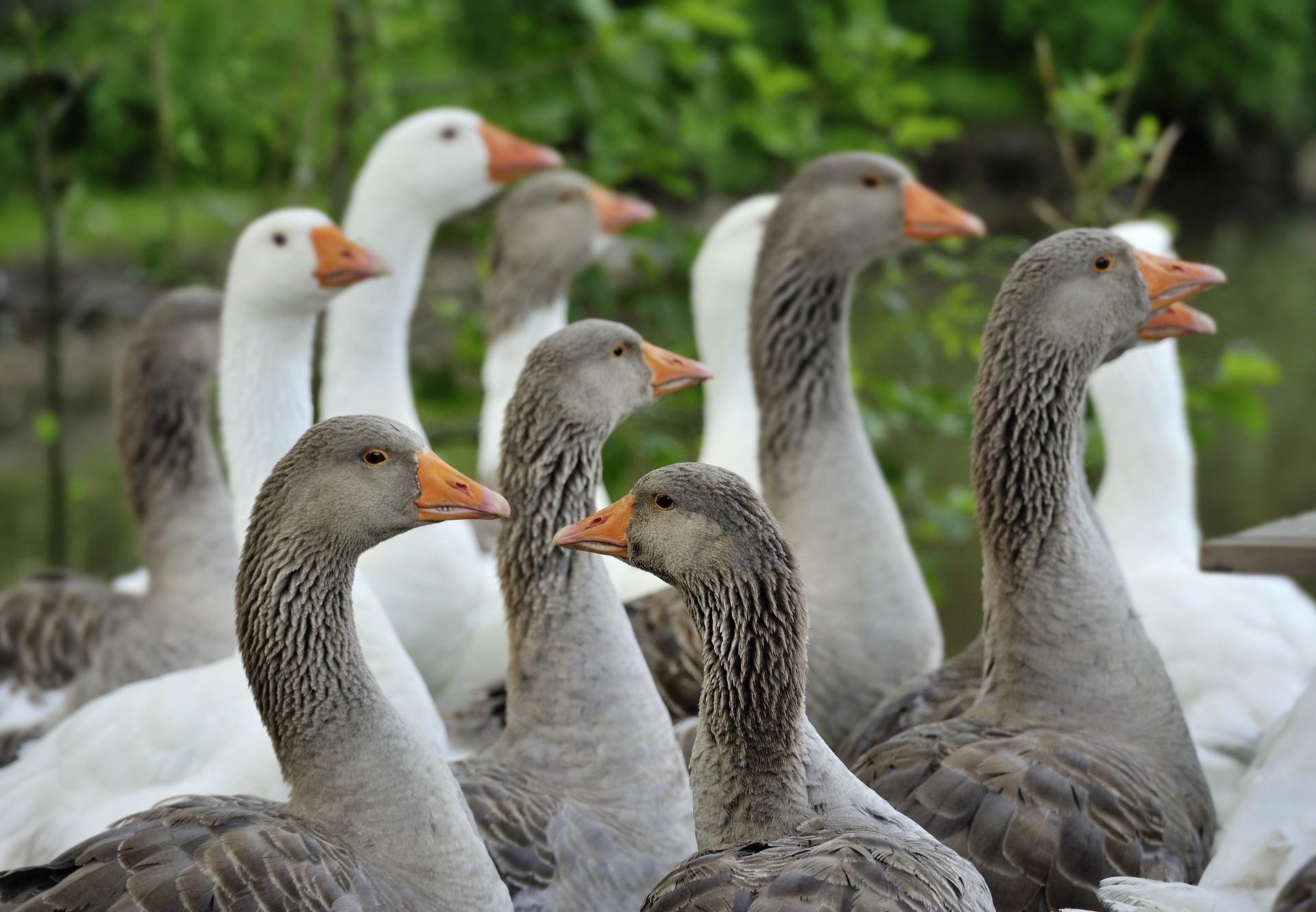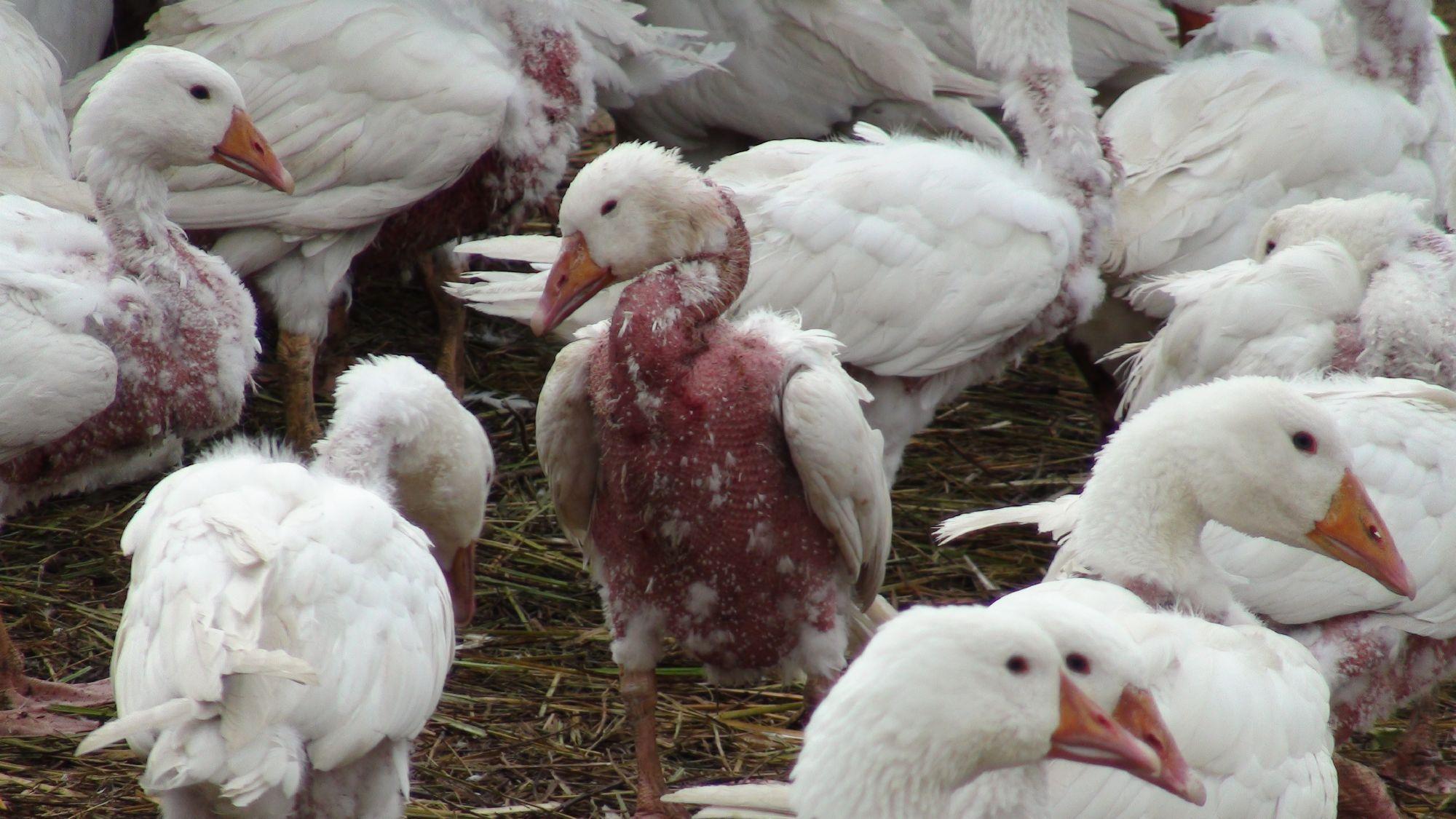
Down
Did you know that over 600 million geese and over 3 billion ducks are raised for consumption annually?
Down is often used for puffer jackets, duvets, and other warm clothing items that are designed to keep people warm. But did you know that down is often sourced using a practice called live plucking, or from birds which have been force-fed?
Live plucking is a widespread and barbaric practice that has no place in today’s world. Hidden from view, geese and ducks are restrained while their feathers and down are torn out1 without the use of any pain relief. Rough handling causes wing and leg fractures and wounds caused by feathers being torn out are roughly sewn shut without anaesthetic. Live plucking can be repeated every five weeks when new down and feathers are torn out and wounds re-opened.
During force-feeding, a metal pipe is rammed into the geese or ducks’ throats and a mixture of corn and pure fat is administered through this pipe, three times a day. Their livers are unable to properly process these large amounts of fat, resulting in abnormal pathologic degeneration, to the extent that their livers can grow up to 10 times its normal size. Down from force-fed animals ends up in jackets, pillows and duvets too.

This is no life for an animal.
What are we doing?
Through our '40 lives' campaign we have achieved amazing success in the UK. FOUR PAWS convinced bedding retailers to commit to only selling feather and down products that are free of live plucking and force feeding. Some companies responded quickly, others needed more pressure, but we didn’t give up until every last one had turned their backs on the barbaric practice of live plucking.
This change is only possible when people stand with us, when we unite and make it known that we expect better for animals.
We will continue to expose the truth behind fashion and to speak out for animals. And thousands of people are now joining us, taking the Wear it Kind pledge and demanding kindness, traceability, and accountability in fashion.
We also offer our expertise to assist with the development and improvement of animal welfare certification systems including the Responsible Down Standard by taking part in its multi-stakeholder consultation processes.

FOUR PAWS UK Team Campaign to End Down in Retail
Did you know?

Millions of kilograms of down feathers are produced by geese and ducks annually, but most brands have minimal knowledge of their welfare, with only 4.1% of all down certified to meet an animal welfare standard.[2]
- Today many brands including Patagonia, Kathmandu, The Northface and Fjallraven offer down-free insulated jackets. They are just as warm, and feel extra amazing because no animal has suffered to make them.
- If you do want to purchase down, at a minimum ensure it is Responsible Down Standards certified. While this provides some assurance, with so many animal-free alternatives available today, it’s never been easier to shop cruelty free!
- Retailers respond to consumer pressure so ask your retailer to stock animal-free alternatives to down.
- Use our Wear it Kind shopping guide to help you make great fashion choices.
- And, if you haven’t already, please take the Wear it Kind pledge today!
Source
2 FOUR PAWS Animals in Fashion Fact Sheet, https://media.4-paws.org/8/0/8/7/8087eb5d763358f8ef231b87c200172c17ffd4c9/2023-03_FAN_animals_in_fashion_factsheet_EN.pdf
3 Number of geese and ducks slaughtered annually based on average figures from UN FAO between 2016-2020. While there is no reliable data available on how much of the global feather production goes specifically to apparel versus bedding and other segments, FOUR PAWS has made a conservative assumption that at least 10% of the animals end up directly in fashion supply chains and reflective of market estimates.
4 Mordor Intelligence 2023, Down and feather market – growth, trends, COVID-19 impact, and forecasts (2022-2027), [accessed 17 January 2023,]
